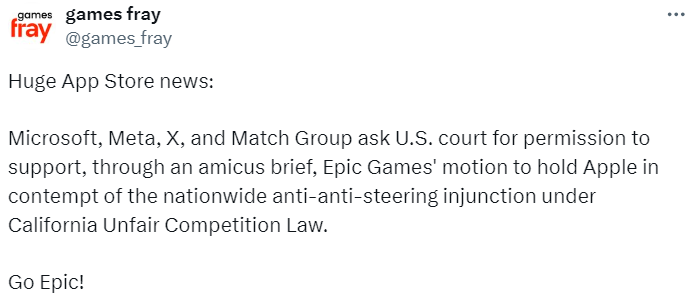
Meta, Microsoft, X, and Match rally around Epic Games in Apple dispute
Epic Games, Joined by Meta, Microsoft, X, and Match Group, challenges Apple in court
- Epic Games, joined by Meta, Microsoft, X, and Match, intensifies its legal battle against Apple.
- Recent legal developments see the Supreme Court rejecting appeals from both Apple and Epic Games.
The ongoing legal battle between Epic Games and Apple, which has captivated the tech world for some time, is escalating. The confrontation has drawn in additional heavyweight players from the tech industry, including Meta, Microsoft, X, and Match, all uniting with Epic Games. These companies are rallying against Apple, accusing it of failing to comply with a court-ordered injunction that pertains to payment processes within its highly profitable App Store.
The origin of the conflict between Epic Games and Apple
In 2020, Epic Games initiated a lawsuit against Apple, claiming the tech giant was operating a monopoly that suppressed competition. This was primarily through its restriction of third-party apps and game marketplaces on iOS devices. However, in 2021, Judge Yvonne Gonzalez Rogers of the U.S. District Court concluded that Apple did not have a monopoly in mobile gaming. Nonetheless, she found that Apple’s prohibition of third-party app marketplaces and its imposition of a 30% commission within its own marketplace were unlawful.
Furthermore, Judge Rogers determined that Apple’s actions breached California’s state laws regarding unfair competition. This was after Apple prevented app developers from promoting alternative payment methods for their services. The Supreme Court, in January, declined to entertain Apple’s appeal, mandating the company to facilitate alternative in-app payment methods.
Earlier this month, the legal skirmish intensified when Epic Games petitioned a federal judge to find Apple in contempt of court. This request was based on allegations that Apple had not adhered to a court mandate that demanded the inclusion of external payment option links within its App Store, as revealed in recent court filings. This is the latest development in the protracted legal conflict between the two firms.
Epic Games has formally requested that Judge Rogers find Apple in contempt of court and compel the company to fully respect the 2021 judgment, as stated in court documents filed in Oakland, California. According to Epic, Apple has rendered alternative payment options practically nonviable by instituting new guidelines and imposing a 27% fee on developers for certain purchases.
Apple has introduced new policy language aimed at deterring users from utilizing purchase options outside the iOS ecosystem, as per Epic Games’ allegations. Additionally, Apple has set forth new regulations that bar developers from creating external links that direct to alternative payment methods.
On January 16, Apple submitted a compliance declaration, asserting that its regulation of external links was a measure to safeguard user privacy and security, and to uphold the integrity of Apple’s ecosystem. As of now, Apple has yet to issue a response to these allegations.
The coalition of tech companies, creators of some of the App Store’s most popular applications, contends that Apple’s actions are a flagrant breach of the September 2021 injunction. This injunction aimed to facilitate consumer access to more economical digital content purchasing options, yet Apple has made this increasingly challenging.

Microsoft, Meta, X, and Match Group joins Epic Games in feud against Apple (Source – X)
Apple’s response and compliance efforts
While Apple has refrained from directly addressing these accusations, which were detailed in a legal filing with the federal court in Oakland, California, it referenced its January 16 announcement. In this statement, Apple claimed full compliance with the injunction, stating its intent to protect consumers and the integrity of its ecosystem, while also ensuring developers contribute their fair share.
Epic’s 2020 lawsuit against Apple argued that the latter’s App Store policies, which mandate that consumers obtain apps exclusively through the App Store and impose up to 30% commissions on developer sales, were anticompetitive. The injunction sought to allow developers the freedom to direct consumers to alternative payment options through links and buttons.
Recently, Reuters has reported that Epic has intensified its efforts, demanding that Apple be held in contempt of court for instituting new rules and a 27% fee on developers, which have essentially nullified the effectiveness of these links.
In a recent legal document, the coalition of technology firms argued that Apple’s practices effectively sustain the anti-steering provisions previously deemed illegal by the court. This, they claim, upholds Apple’s “exorbitant” commission fees, to the detriment of both consumers and developers.
“Apple’s restrictions on where and how developers can communicate with their users about their options for purchasing in-app content create significant barriers to competition and artificially inflate prices,” the document states.
In January, the Supreme Court opted not to review Apple’s appeal against the injunction, nor did it consider Epic’s challenge of the lower court’s verdict that Apple’s policies did not contravene federal antitrust laws.
Apple has been given until April 3 to formally reply to Epic’s recent filing. The ongoing legal battle underscores the complex dynamics at play within the tech industry, highlighting significant debates over market competition, consumer rights, and the future of digital marketplaces. Apple, headquartered in Cupertino, California, and Epic Games, based in Cary, North Carolina, remain at the forefront of this legal confrontation.
READ MORE
- Data Strategies That Dictate Legacy Overhaul Methods for Established Banks
- Securing Data: A Guide to Navigating Australian Privacy Regulations
- Ethical Threads: Transforming Fashion with Trust and Transparency
- Top 5 Drivers Shaping IT Budgets This Financial Year
- Beyond Connectivity: How Wireless Site Surveys Enhance Tomorrow’s Business Network




